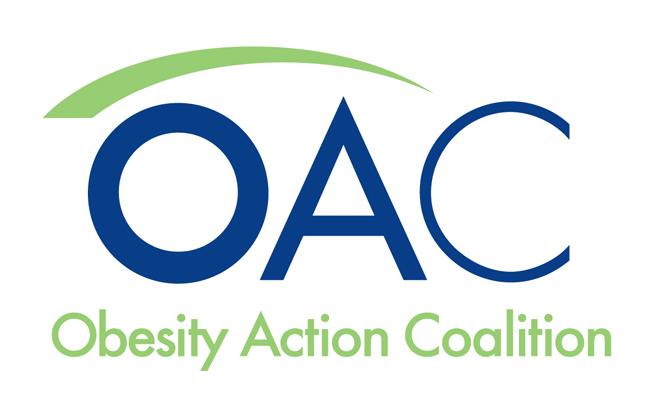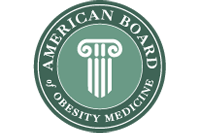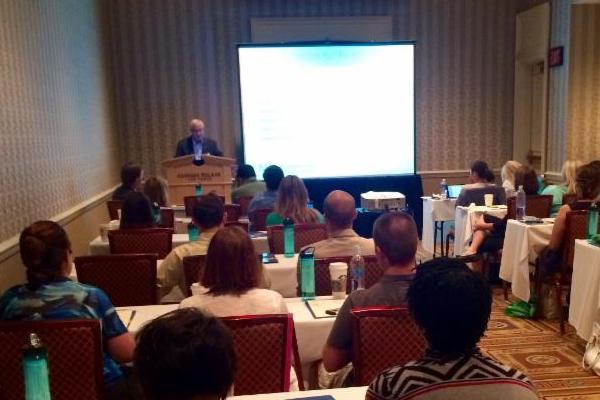 Fellowship in clinical obesity and metabolism at UTHealth
The University of Texas Health Center for Obesity Medicine and Metabolic Performance recently issued a call for applicants for a one-year fellowship in obesity medicine. This fellowship is one of only a few fellowships in the U.S. that focuses on comprehensive training in obesity medicine. Trainees will spend most of their time in a clinical setting learning about obesity and its comorbidities. If you or someone you know is interested in applying, review the full description and application requirements for this fellowship. |

Call for speakers: Help OAC present the best education for patients at Your Weight Matters Convention
Each year, the number of patients attending the Obesity Action Coalition's (OAC's) Your Weight Matters Convention grows as OAC continues to provide education about the latest weight-management strategies from the top minds in the field of obesity. OAC is currently holding an open call for speakers and topic suggestions and invites all OMA members to participate. If you have a great idea for educating patients or you wish to give a presentation at OAC's convention, submit your ideas during this open call for speakers. OAC's program agenda subcommittee will first select topics to be presented, then choose speakers with the expertise for each topic to lead the sessions. OAC welcomes your input in this critical process, so it can continue to offer the best obesity education for convention attendees -- many of whom are your patients. Submit your ideas online now through Jan. 8. |

ABOM announces 2016 certification exam testing window
The American Board of Obesity Medicine (ABOM) 2016 exam testing window is Dec. 3-10. The certification exam will be offered at computer-based testing centers throughout the U.S. and Canada during this period. For all exam-related information and eligibility requirements, visit www.abom.org. 2016 application deadlines:Early: July 12, 2016 ($1,500) Final: Aug. 30, 2016 ($1,750) Remember, all CME hours earned from OMA count toward qualifying for the exam. Earn live CME credit from us at Obesity Medicine 2016 and Overcoming Obesity 2016, and earn additional hours from our recordings. |
 Don't forget, use AmazonSmile while you shop
If you're shopping for gifts this holiday season, use AmazonSmile and support the foundation while you shop. As long as you select the Obesity Treatment Foundation as your charity (it's already selected for you here), Amazon will donate 0.5 percent of your purchase back to the foundation. |
 |
Weight loss on low-fat versus low-carbohydrate diets by insulin resistance status among adults with overweight and obesity: A randomized pilot trial
Gardner, C. D., et al. Obesity, 2015.
A study was conducted to determine if degree of insulin resistance affects weight-loss responses to either a low-fat (LF) or low-carbohydrate (LC) diet. Insulin resistance was determined based on insulin area under the curve during an oral glucose tolerance test, and subjects were categorized based on if their insulin was higher or lower than the median. Participants were put into either a low-fat or low-carb group and attended 14 one-hour classes over the course of six months: once every week for eight weeks, then once every other week for eight weeks, and then once every month for eight weeks. LF participants were instructed to reduce their intake to 20 grams per day (g/day) of total fat; LC participants were instructed to reduce their intake to 20 g/day of digestible carbohydrates. The study found that at six months, weight loss was 7.4 kilograms (kg) for the low-fat, insulin-resistant (IR) group, 10.4 kg for low-fat, insulin-sensitive (IS) group, 9.6 kg for the low-carb, insulin-resistant group, and 8.6 kg for the low-carb, insulin-sensitive group. There were no significant differences for weight loss by diet group or IR status. Fasting insulin concentrations decreased significantly more for the two IR groups than the two IS groups, although this might be expected given that there was greater capacity for improvement in the IR groups. Overall, this study shows that there were no differences in weight loss by diet, by IR-IS status, or by the interaction of these conditions. View article
|
|
|
*These events are hosted by organizations other than OMA. Contact the organization directly for details.
|
Use the member badge artwork to display your member pride on your website and in your email signature! Log in to get the code.
|
|
Executive Director
Sponsorships and Exhibits Manager
Operations Manager
Education Coordinator
Communication Manager
Executive Director of the Obesity Treatment Foundation
|
|
101 University Blvd.,
Suite 330
Denver, CO 80206
|
|
|
Weighing in on pediatric obesity: Weight screening at the dental visit
Ziegler, J., and Hughes, C. V. J Am Dental Assn, 2015.
Given that dentists regularly see children for their dental checkups, they are uniquely positioned to provide screening in their offices for children affected by overweight or obesity. This review provides reasons and approaches for dentists to screen for obesity. The authors suggest that dentists should measure weight and height during the patient's first visit and at each six-month dental visit to allow for assessments of weight status over time. Providers then should compare body mass index (BMI) percentiles over time to identify trends or trajectories. This early detection may allow them to make appropriate referrals in a timely manner to address any weight concerns. Obesity medicine specialists might consider reaching out to their local oral health care providers to help facilitate this early screening. View article
|
Obesity and iron deficiency: A quantitative meta-analysis
Zhao, L., et al. Obes Rev, 2015.
A connection between obesity and iron deficiency (ID) was first suggested in the early 1960s. A meta-analysis was recently conducted to assess the differences in hematological iron markers and risk of developing ID in people with and without obesity. Twenty-six studies were analyzed, which included 13,393 participants with overweight or obesity and 26,621 participants without overweight or obesity. The analysis found that individuals with obesity had lower serum iron concentrations and lower transferrin saturation percentages compared to individuals with a normal weight. This contributed to a higher risk of ID. Interestingly, the authors found a significant correlation between ID and obesity in studies without a ferritin-based diagnosis but not in studies that used a ferritin-based diagnosis. Given these findings, the authors concluded that obesity is significantly associated with ID, and they recommend early monitoring and treatment of ID in patients with obesity. View article
|
 |
 This spring we're headed to San Francisco for Obesity Medicine 2016, your leading resource for certification exam review and the premiere source of education about managing an obesity medicine clinic, nutrition, and the comprehensive approach to obesity treatment. Build your schedule* to include the courses that most interest you, and earn up to 30 CME/CE. |
Review Course for the ABOM Exam
13 CME/CE | April 6-7
Helps prepare those planning to take the American Board of Obesity Medicine (ABOM) certification exam.
| Practice Management Essentials
6.5 CME/CE | April 6
Explains the best business practices for running an obesity medicine clinic, from setting up a practice to boosting patient retention.
|
|
Nutrition Course
6.5 CME/CE | April 7
Outlines the latest evidence-based findings about nutrition and helps you select appropriate nutrition plans for your patients.
| Spring Obesity Summit
17 CME/CE | April 8-10
Addresses topics related to current and emerging research, evidence-based treatment approaches, technologies, and practical methods used by obesity medicine clinicians.
|
|
|
*The Review Course for the ABOM Exam runs concurrently with Practice Management Essentials on Wednesday and the Nutrition Course on Thursday. Registration for the Review Course includes two days of class time, and switching between courses is not allowed.
|
 This one-day course is worth up to 7 CME/CE hours and provides introductory-level training about the evaluation and treatment of patients affected by obesity. Refer a colleague to a course in their area and allow us to introduce them to obesity medicine -- you'll receive a $50 Amazon gift card for every attendee who lists you as their referring member! Learn more about this course. Course dates and cities:- Jan. 16 | Indianapolis
- Jan. 23 | New Orleans
- Jan. 30 | Philadelphia
- Feb. 20 | Raleigh
- Feb. 27 | San Diego
- July 16 | Houston
- July 30 | Minneapolis
- Aug. 13 | Orlando
|
|
|
|
The Obesity Medicine Association and the Obesity Treatment Foundation thank our 2015 Corporate Advisory Council members for their continuous support.
|
© 2015 Obesity Medicine Association. All rights reserved. Materials may not be reproduced, redistributed or translated without written permission. Advertising disclaimer: Under a policy approved by the OMA executive committee and exhibitor/advertiser review committee, commercial companies may apply to advertise in OMA publications. Approval does not imply endorsement or official recognition of particular products or services.
|
|
|
|